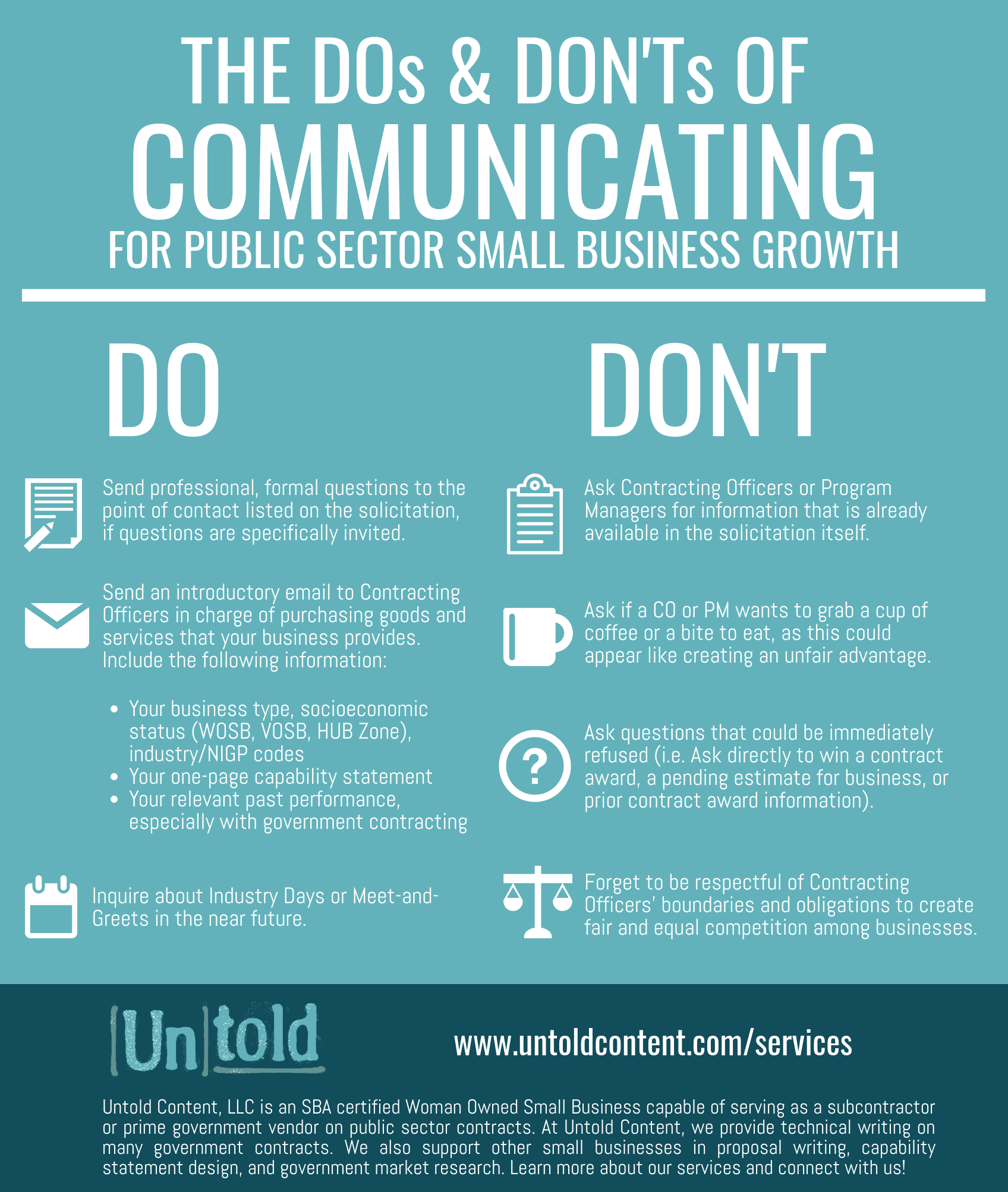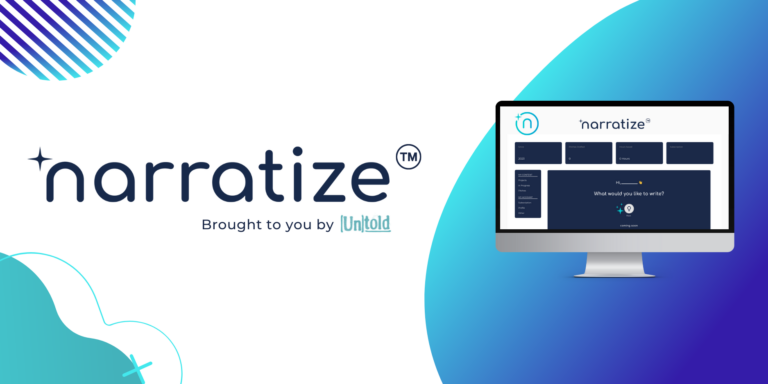Blog >> How to Communicate Effectively for Public Sector Business Growth
How to Communicate Effectively for Public Sector Business Growth
In this article, we share how to connect and communicate effectively in the public sector when pursuing small business government contracting opportunities. If you’re looking to grow your business network within the public sector so that you can win a government bid, it’s essential to:
- Connect with decision makers;
- Have a clear understanding of the needs of agencies you want to work with; and
- Make sure they know your capabilities.
Be sure to read all the way to the end to get our Five Tips on Building Good Relationships with Contracting Officers as well as our infographic on the Dos and Don’ts of Communicating for Public Sector Growth!
How Small Business Owners Can Build Relationships for Government Contracting
As a small business looking for government work, there are two types of government professionals with whom you should build relationships: Program Managers and Contracting Officers (COs). These terms are predominantly used on the federal level, but it is good to be aware that other titles may be used on the state level. COs are responsible for finding business solutions that meet the needs of Program Managers. COs write solicitations and promote competition from private businesses so they can procure the best product or service for their customer, the Program Manager.
The Program Manager’s role is to represent the budget owner. This person is typically responsible for the product or service description that is ultimately reflected in the solicitation. Program Managers look to COs for trusted business advice and are dependent on the COs to purchase products and services from the private sector. In addition to these professionals, small businesses should develop a relationship with state-level Governor’s Office Small Business Divisions. These divisions offer resources and assist businesses in identifying procurement opportunities.
When you are seeking to establish relationships with these professionals, keep in mind their respective roles. Program Managers know more about the product or service being acquired, whereas COs have more insight into how the requirement will be competed and when the solicitation may be released. Each role should inform your relationship development strategy.
Communication Strategies for Small Business Government Contracting
There are two general rules of thumb for engaging Contract Officers and Program Managers in communication.
The first rule of thumb is that once a solicitation is released, COs and PMs are generally restricted from individual communication with industry.
This restriction exists to avoid any scenario where a supplier obtains information that may give them an unfair advantage or preferential treatment. Communication with government officials after release of a solicitation is possible, but it is done through formal channels like written submissions where questions and answers are shared openly with all interested parties.
The second rule of thumb is to ask questions that create mutual value for yourself and the government.
If you are inquiring about a future solicitation, you may want to ask the CO or PM if they are aware of the specific features of your product or service that make you different from the competition. If you have done your homework and know the market well, these types of questions can open the door for sharing your capability statements and product specifications, which can be used by the CO and PM to make updates to their product or service requirements.
It is also important to let them know of your small business status, as COs often want to understand the market for their customer’s product or service. There are socioeconomic programs that can reserve competition for certain categories of small businesses like veteran owned businesses or those located in historically underutilized zones. Read our advice on how to write a capability statement and download our free capability statement template for additional guidance!
While communication between government & industry is necessary to a thriving public sector market, there are things that every small business owner must keep in mind for maximizing communication with COs and PMs. For one thing, COs and PMs are typically risk averse and hesitant to share information that could put them in an ethical quandary, or lead to an unbalanced competitive field. Refrain from asking questions that lead to an unfair competitive advantage for your business or that could be perceived as giving you preferential treatment. These types of questions almost always put the government professional on the defensive and can degrade the quality of communications you have with them.
Here are some additional tips that you can follow to build good relationships with Program Managers and Contracting Officers.
5 Tips for Building Good Relationships with Government Contracting Officers and Program Managers
Tip 1: Connect with Contracting Officers
Easily find contact information for Contracting Officers on contracting sites like SBA, FedConnect, and BidView. It’s sometimes difficult to find the human behind specific government requests. Some of these resources place contact information, including email addresses and phone numbers of Contracting Officers clearly on each bid opportunity so you can reach out with formal questions or communications. If the solicitation has been released, your best bet is to communicate with the CO by asking relevant questions through show your careful understanding of the solicitation and your knowledge of the goods/services being requested.
Tip 2: Ask Really Relevant Questions
Follow the solicitation’s instructions for question-posing, and then ask well thought-out questions regarding specific solicitations. If you find that your business would be competitive for a specific solicitation, note first whether or not questions are encouraged at this time. This information is also provided clearly within most RFPs and RFQs. If the solicitation states that questions are welcome before a certain deadline, that’s a great opportunity to connect and ask relevant questions about what the government is looking for. Typically, these questions are submitted in writing to the relevant point of contact. Note that your questions and the subsequent answer will be shared publicly, so consider whether your question could lead to an answer that degrades your own competitive advantage.
Tip 3: Do Your Homework and Read All Solicitations Carefully
Do NOT ask questions that are answered in the solicitation itself. Although it’s great to announce your interest in an opportunity and get clarity of the government’s needs by asking questions to a Contracting Officer, you want to make sure that your questions are justified and not already addressed in the solicitation. Contracting Officers are often busy and overwhelmed, so read carefully through the solicitation first. A key component of establishing connection with the government program at hand is to do your homework and dive into the information provided. From there, you can ask appropriate, formal questions.
Tip 4: Share Your Capability Statement + Ask About Industry Days
Reach out to share your capabilities and past performance. If you don’t plan to apply for a specific solicitation, you can still easily find contact information for Contracting Officers who frequently request products or services like the ones you provide. It’s a good idea to send a very basic email to COs informing them of your core competencies and past performance in government work. Introduce your company briefly. Identify your socio-economic or set-aside status (WOSB, VOSB, SDVOSB, HUB Zone). List your appropriate NIGP or NAICS codes. Attach your one-page capability statement (read our advice on writing a capability statement). And conclude with a call-to-action: Ask whether there are any Industry Days on the horizon, or any meet-and-greets you could attend to learn more about their needs. Direct them to learn more on your website, and position yourself as an asset for future market research purposes.
Tip 5: Conduct Market Research by Analyzing Previous Awards
Contracting Officers and businesses who work with the government must honor the ethical boundaries that maintain fair and equal competition for all industry partners. Your best path to gaining a competitive advantage for your business is not through a specific solicitation, but rather through understanding the general needs of your target agencies and positioning your business to satisfy requirements that have not yet been put out for bid.
We recommend careful analysis of agency strategic plans and budget requests to gain insight into upcoming procurements, and then positioning your business as a uniquely qualified supplier for those upcoming requirements. You can also analyze previous awards on beta.sam.gov to see which prime government vendors are winning which contracts for what award amount.
The most important take-away from these tips is to make sure your business is on the government’s radar. Create a strategic communications plan for your business that includes a forecast of the procurements that are on the horizon. Follow the guidelines listed above, and check out our quick Dos and Don’ts below!
The Dos and Don’ts of Communicating with Government Contracting Officers

At Untold Content, we provide technical writing on many government contracts and subcontracts. We are an SBA certified Woman Owned Small Business capable of serving as a subcontractor or prime government vendor on public sector contracts. We also support other small businesses in proposal writing, capability statement design, and government market research. Learn more about our services and connect with us!




